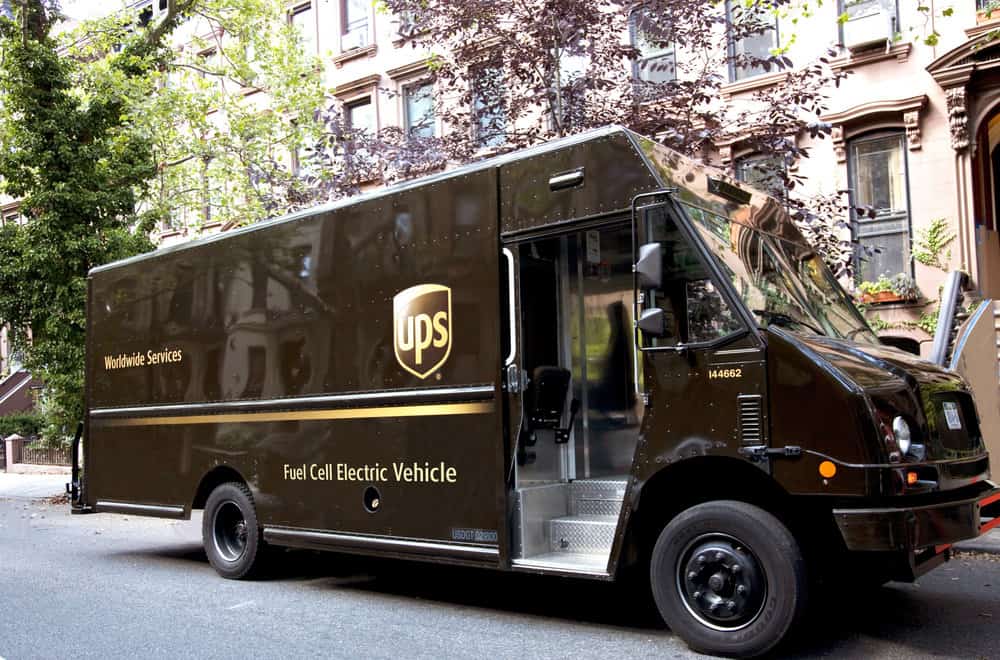
Workhorse also unveils electric pickup at ACT Expo
UPS says it will be putting hydrogen fuel cell trucks into operation later this year in California. The announcement was made this week at ACT Expo in Long Beach, CA, a leading alternative fuels transportation conference.
Also at ACT, Workhorse Group took the wraps off its electric pickup and Lightning Systems announced a new analytics program it says will reduce fuel use and optimize vehicle mies.
The vehicle UPS unveiled is an extended range fuel cell electric vehicle (FCEV). It is part of the package delivery giant’s Rolling Laboratory, a growing alternative fuel and advanced technology program. UPS says the Class 6 medium-duty truck meets the same route and range requirements of conventional fuel vehicles but emits no emissions.
The truck will use the onboard fuel cell to generate electricity to propel the vehicle. The first prototype will go into operation in Sacramento, CA, in the third quarter with a plan to add more FCEV trucks in California. California was chosen for the pilot because of its strict emissions requirements and a growing infrastructure of hydrogen fueling stations around the state, UPS says.
“The challenge we face with fuel cell technology is to ensure the design can meet the unique operational demands of our delivery vehicles on a commercial scale,” says Mark Wallace, UPS senior vice president global engineering and sustainability. “This project is an essential step to test the zero tailpipe emissions technology and vehicle on the road for UPS and the transportation industry. We have a long history of developing and promoting the use of more sustainable alternative fuels with our Rolling Laboratory, and hope that by bringing our unique expertise to the development of hydrogen fuels, we can help advance the technology.”
Each FCEV produces electricity which continuously charges the batteries, thereby providing additional power and an extended range of 125 miles. The UPS trucks are equipped with a 32kW fuel cell coupled to 45kWh of battery storage and 10kg of hydrogen fuel. The drivetrain runs on electricity supplied by batteries.
The fuel cell is created by Hydrogenics, a fuel cell developer.
The truck was created in part with a 2013 Dept. of Energy fuel cell project grant. The project calls for retrofitting conventional fuel trucks with fuel cell electric systems designed for use in a delivery truck duty cycle. UPS is partnering with the Center for Transportation and the Environment as well as Unique Electric Solutions LLC and the University of Texas’ Center for Electromechanics on the project.
Related:
Toyota’s hydrogen fuel cell powertrain designed to haul 80,000 pounds
Elon Musk releases image of possible Tesla Semi
Why U.S. Xpress is backing the Nikola One hydrogen-electric tractor
UPS has more than 8,300 vehicles in its Rolling Laboratory to determine best applications for each. It has invested more than $750 million in alternative fuels and advanced technology vehicles and stations since 2009.
UPS is not the first company to announce a fuel cell vehicle. Just two weeks ago Toyota Motor Corp. announced a hydrogen fuel cell Class 8 tractor system. Project Portal will see the vehicles begin testing running routes between the Ports of Los Angeles and Long Beach this summer.
Video: Toyota’s hydrogen fuel cell tractor in action
Toyota says the truck generates more than 670 hp. and 1,325 lbs.-ft. of torque from two Mirai fuel cell stacks and a 12kWh battery. The concept’s gross combined weight capacity is 80,000 lbs., and its estimated driving range is more than 200 miles per fill under normal drayage operation.
Nikola Motors hopes to begin testing a hydrogen-powered electric tractor later this year as well and Tesla founder Elon Musk plans to unveil an all-electric Class 8 tractor in September.
In other announcements from this week’s ACT Expo, Lightning Systems, formerly Lightning Hybrids, announced its LightningAnalytics program.
A cloud-based analytics solution, it provides fleets with precise and validated information focused on optimizing fuel efficiency, drive cycles and routes, driver behavior, and vehicle health. This is achieved through high-frequency recording of many real-time parameters from the vehicle, followed by expert data analysis, resulting in reports that provide insights and actionable recommendations for fleets.
LightningAnalytics is already available to Lightning Hybrid’s customers, and will be available as a standalone product for commercial and government fleets that operate diesel, gasoline, hybrid, CNG, and full-electric powertrain systems in the fall. The company says is will reduce fuel usage, optimize routes, monitor vehicle health, and track driver behavior.
Workhorse debuted its W-15 extended range electric pickup. The W-15 offers crash mitigation technologies, including automatic braking and lane centering. Electric power is supplied by Panasonic 18650 Li-on batteries and includes an 80-mile all-electric range for 75 MPGe while in all-electric operation. The 80 mile range is designed to cover the majority of the miles driven in a day by fleets, Workhorse says. If needed, the on-board gasoline generator will then operate after battery power has been depleted, extending the range. To reduce weight, the W-15’s body panels are made of a carbon fiber composite which also have the benefit of being rustproof.
Workhorse says it has orders for 2,150 of the pickups already from leading electric utilities among others.










